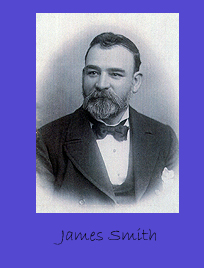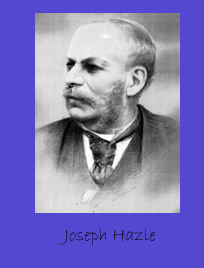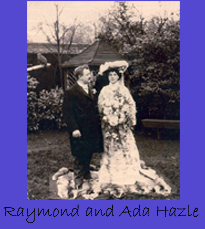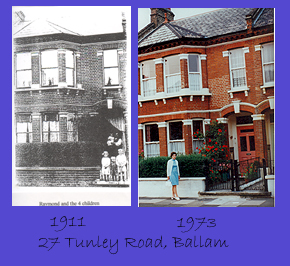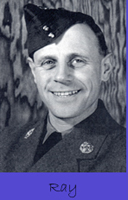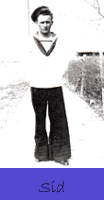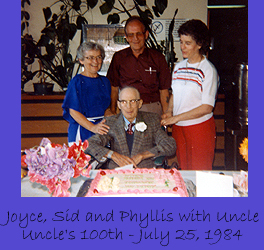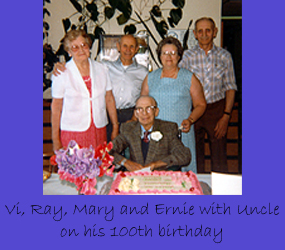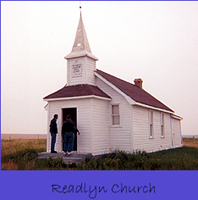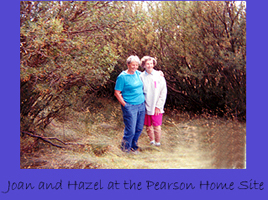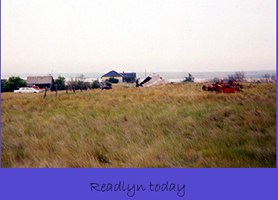The Hazle Family Chronicle
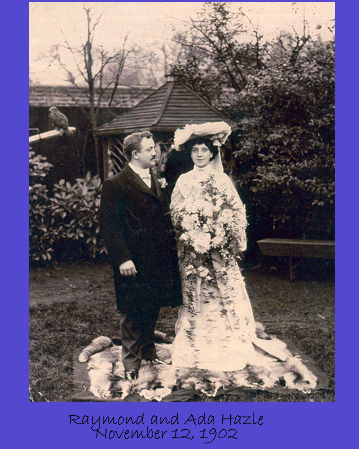
From Information Provided by Descendants of Raymond Hazle, especially Vera Pearson Foster and Joan Pearson
Raymond Hazle had been pampered by his mother and raised as a "gentleman" in England so it must have taken great courage for Raymond, his first wife Ada and their four small children to leave their home in England to head for the "Colonies" and a largely unknown way of life. He was certainly not used to the hard labour necessary in his new life. In his later years he suffered from severe depression, and felt that he had let all his children down badly. But he was a product of his times - his parents had been well-to-do and, as sometimes happens in wealthy families, the children were not properly trained to manage the family fortune. He lost most of his inheritance through poor judgment, bad investments, and lack of knowledge, but he sired nine children, and though they lived in poverty in Canada, the eight who lived to adulthood received a good moral foundation and a sense of integrity that they have passed on to their descendants.
These stories have been gathered from e-mails, letters, visits - and just plain memory! Vera and Joan went to Calgary to meet with Sid and Art (Raymond's youngest sons) and then on to Winnipeg where they had a wonderful opportunity to see Ray again. It was great to hear, first-hand, stories of the events of his early life. It is too bad that as children, we do not listen more carefully to the stories of the "olden days" our parents tell us. Brenda (Hazle) Larrance has sent some of Ronnie's stories, and Joan and Vera have contributed as well. Hopefully they have been put together so they are of interest to the rest of the family. It has certainly given a much better understanding and appreciation of my mother, Edith, and of her family values and will hopefully do the same for you and your branch of the Hazle family.
The few pictures that we have of the first family were all taken in England, and in most cases were studio portraits. Once the family was in Canada, and with money very tight, there was nothing left over for providing pictures of special events let alone everyday happenings. We do not have a wedding picture of our parents (Edith and Percy Pearson) and I doubt if there is one in existence for Raymond and his second wife Mildred. Sid and Joyce have provided me with the picture of Mildred that was taken before she left England, and also other pictures of the second family in their early teens and later.
Raymond Ernest Hazle was born May 21, 1874 in London. He had an older sister, Emily Baker (known as Aunt Emmie who married Mark King) and a younger brother, Arthur Edmund (who died leaving no issue). Raymond was born into a very well-to-do family. His father, Joseph Hazle (d. October 18, 1891), and mother, Eliza Baker Hazle (d. March 14, 1902) left a sizable fortune to the three children, said to be £250,000, a great deal of money in those days. Joseph made his fortune in real estate - houses and hotels. He was a publican, owning the Oxford Arms as well as several other pubs. Raymond was brought up in the Westminster Abbey church school and sang in the choir at the Abbey. At that time, you had to buy your way into the Abbey, and the family had enough money to do so. There is a picture in the family somewhere of a church service for Queen Alexandra, in Westminster Abbey, and Raymond is in the boys' choir in the loft. The family had so much money that they didn't need to worry about spending wisely or saving. Raymond was not taught how to handle money, and when he inherited his fortune he made some bad investments and eventually lost most of it.
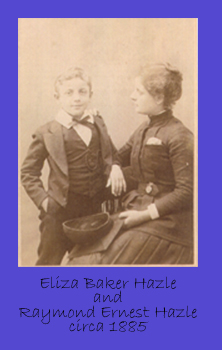
It is believed that the Hazle family was of German extraction and that the name was originally spelled Hazel. At some point, someone decided to change the spelling, possibly because of the animosity towards the Germans. It is possible that all the "Hazles" in the world are related in some way or another. Ray and his wife, Violet, were watching TV one day and a First Nations woman dressed in native attire appeared - her surname was Hazle. Who knows?
Raymond's first wife, mother to the first family, Ada Edith Smith, was born on November 4, 1879 and also came from a well-to-do family. James and Emma Maude Chappell Smith had 11 children, including Claude Herbert, who became well known and respected by relatives and friends in Canada, many of whom called him "Uncle". There was also a step-sister, Ethel Ernily, as James remarried after his first wife died. James was always a hardworking man who knew how to manage his fortune and left a sizable amount to his children. James also made his fortune in real estate. An innkeeper, he owned and operated the Albert Hotel in Kingston - a real moneymaker as it was on the London Road where there was always a lot of traffic. The sons were expected to help in the hotel but they all hated the bartending. When they had had enough of pubbing, many of them scattered to other parts of the world. (Uncle was a teetotaler - he said he had seen enough of drinking in England and wouldn't have anything to do with liquor.) Percy went to Australia, and Sydney and Ernest Victor (Jack) went to the United States. (Jack later returned to England and was killed when the sweet shop he owned was bombed during the war.) Claude emigrated in the early 1900's to the United States and later to Saskatchewan. Both Walter and Ada went to Saskatchewan, and both met early deaths -Walter in 1908 and Ada in 1915.
|
|
|
James Smith died in 1918 or 1919. Uncle said that he was a wide-shouldered man, just like Joseph Hazle, and was his own bouncer at the pub - his undoing. The pub was on Kingston Hill, a rather steep hill, and the carters, the people with two-wheeled carts and a horse, used to stop in there for a beer or an ale. It was thought that one of them decided to come back later and rob the place, but Grandpa Smith wasn't about to be robbed. He was beaten up for his efforts, and died of the beating.
As both families were in the same business, they knew each other well and eventually Raymond courted Ada. They married on November 12, 1902. The wedding pictures are taken in the back garden at the Albert Hotel, in Kingston. After their marriage they lived at 27 Tunley Road, Ballam, where all four children were born. Raymond Arthur Joseph Hazle (September 7, 1903), Edith Annie, (April 1, 1905), Ernest Claude (June 8, 1908), and Ronald Henry (June 22, 1909). The four children were all born in the upstairs bedroom - the room with the bay windows.
|
|
|
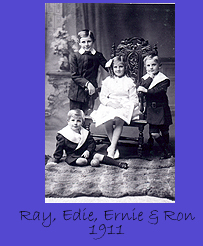 |
When the children were young life was probably pretty luxurious. The family had nursemaids and Ray remembers having a "lovely life" in England in the early days. Edith wrote regularly to "Auntie Annie". We're not sure who she was but don't think she was a relative. She could have been the nursemaid at one time. She was always very good to the children and was almost like one of the family. In England at that time housekeepers and nursemaids were often passed down through families, from generation to generation.
Uncle immigrated first to the United States, possibly Boston. He was working in a Carborundum factory when he heard about a land giveaway in Canada, so he went to Saskatchewan to put in a claim. In order to qualify for the land, homesteaders were required to live on it for six months of the year and to "break" ten acres a year. Each winter, Uncle lived in Moose Jaw, working to raise money to buy machinery and supplies to do him for the following summer.
Uncle returned to England for Christmas in 1913 where Ada spent a great deal of time grilling him about life in Canada. Raymond was drinking heavily and she wanted to get him away from his drinking buddies. She wanted Raymond to return with Uncle in the spring to help him with the farm. She and the four children would follow later in the fall, once he was established. Uncle did his best to dissuade her. He knew what the winters and pioneering life were like in Saskatchewan at that time, but she was determined that the family should start a new life in Canada. She finally convinced Uncle to let the family come and on March 12, 1914 Raymond and Uncle arrived in New York on the RMS Victoria.
When Raymond left England, he left Ada with three gold sovereigns to keep the home going - about three pounds. Ray remembers the neighbour, Mr. Taylor, saying, "My, your husband left you comfortable."
Ada and the children, aged 5 to 11 years, left London on August 1, 1914, just three days before World War I was declared. It's interesting to think how life could have been so different - if the war had broken out a few days earlier, they might not have come to Canada - and we'd all be British instead of Canadian or American! They traveled on to New York and from there by train all the way to Readlyn. Ray remembers it being a terrible trip. They were in what was called a "tourist car," which had a stove at the end where Ada cooked the meals.
When Uncle and Raymond arrived in Readlyn in March of 1914 they set about building a new house for the family, but it was only half finished when Ada and the children arrived. It must have been heartbreaking for her to see it after their lovely brick home in England. The winters there were very long and cold, and there was no insulation in the house. In the early days they usually brought in a fresh pail of water from the well at night, ready for their morning needs. Invariably, it was frozen solid the next morning because they couldn't get enough coal to keep the house warm all night.
Raymond lost a lot of his money before he left England, mostly through poor investments, but he did continue to receive some dividends after he arrived in Canada. These eventually dried up and as there was very little income from the farm, at least until the land could be broken and wheat planted, life was pretty tough. The land they homesteaded was also poor. The homesteaders saw the "Lake of the Rivers" and it reminded them of farms by the lochs in Scotland, so they picked out acreage near the lake. But the land was very stony and it had to be broken up. It looked fine when the lake was full but when it dropped they found that the land was alkali.
Soon after the family moved to Canada, Ada became ill and died in September of 1915. Edith was never sure just what she died of, but thought that it was probably tuberculosis (or consumption as it was called in those days,) or leukemia or even depression. Ray says, "She took to her bed after we came to Canada and she never left it." Edith remembers her wasting away, with no energy, for months. She always said that her Mom died of "a broken heart" and I'm sure that must have contributed to her death. She was a strong, independent woman but the hardships of farm life with minimal amenities, and a very harsh winter were probably just too much for her.
After Ada's death, Raymond and the four children stayed on the farm with Uncle but Uncle joined the Army in 1916 and Raymond was now on his own with them. He managed to keep the farm going while Uncle was away but it was very difficult as money was tight. Raymond got a job hauling the mail twice a week, from Maxwellton and Davyroyd to Willows, a trip of about fourteen miles each way. He earned $30 a month - a lot of money in those days. It helped to keep the family in groceries.
On one of these mail trips, Raymond was stuck in town while a blizzard raged for three days. He had left the four children at home but had told them that if for any reason he couldn't make it back, they were not to worry about the animals - they would be all right until he got back. When the family came to Canada they "didn't believe in the smell of animals" so they built the barn 125 yards away from the house - hopefully the smell wouldn't penetrate to the house. But the children were concerned about the animals and decided to try to get out to the barn to feed them. Halfway between the house and the barn was an unroofed granary. It was usually used to store the grain but at this time there was no grain so they had put the turkeys into it. During the blizzard it filled up with snow and the turkeys suffocated. Ray and Edith left the two younger boys in the house. They could see the granary from the house and made their way to it, after securing a rope to the door of the house. From the granary, they could see the barn, and were able to make their way there safely. They used the rope to guide them back to the house after feeding the animals and getting more coal. Had anything happened to Ray and Edith, Ray says that no doubt Ernie and Ron would have frozen to death, too. At that time they burned lignite coal that was found in the hills near Readlyn. This is very soft coal - and very wet. It smothers itself and won't burn properly until it dries out. It was very difficult to get the fire going well enough to dry out the coal. Ernie and Ron would probably not have been able to keep the fire going. Ray doesn't remember much about what they had to eat, but he does remember cooking toast on top of the cook stove, and eating it with lard. By the time Raymond got back, the horses were exhausted and the children were out of food. I'm sure Raymond must have expected the children to be frozen to death by the time he returned. They had managed with the lignite coal to keep the cook stove going during the day and then they had all huddled together at night to keep warm. Ray remembers Edith waking up in the morning with hoar frost on top of the covers. It is hard to imagine that these were city kids not long out from London. What a change from their coddled life in England to the harsh life on the Prairies, but they seem to have become pretty resourceful in a very short time.
A story tells of a very bleak Christmas on the farm. There was very little for food, let alone extras. Sometimes the only gift in Ron's stocking was an orange, but it was very special to him. This particular Christmas, his Dad couldn't even afford an orange for his kids. They awoke Christmas morning to empty stockings. Whenever Ron told this story, he always cried to think how awful his father must have felt not even to be able to give his kids a piece of fruit on Christmas. Needless to say, the children were very disappointed. Sometime later in the day, there was a knock on the door. Their neighbour, Mr. Stringer asked the children if Santa had been there and they sadly shook their heads. He told them that he thought maybe that was the case and he produced a bag with the name "Hazle" on it. He said that he had found it on the road and he just knew it must have fallen off Santa's sleigh! It was filled with food and toys for all! It was one of Ron's happiest Christmas memories and he always said that Mr. Stringer surely earned a spot in heaven for his kindness. I don't remember Edith telling this story, but she thought the world of the Stringers. I'm sure this was just one of many kindnesses that helped to provide a few happy memories for the kids.
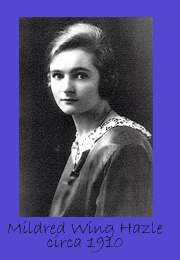
With Uncle away in the Army, Raymond was finding it very difficult to manage the farm and look after the children. Back in England, his sister, Emma, knew Mildred Mary Wing (b.February 18, 1887) who lived in Bames, about seven miles from Surrey. She came from a small family of middle class merchants. Her brothers all served in the first war - Sid, the oldest, was a Sergeant in the Red Cross - considered to be a doctor in the army. Aunt Emmie suggested that Mildred immigrate to Canada to keep house for Raymond but Mildred would not come unless Raymond married her. The children begged him not to remarry - they felt they were managing just fine and didn't need another mother. However, Raymond really felt that he needed a woman in the house so he agreed. Mildred came out by train (from New York?) in 1917. She got off by mistake at Forget, which is over 125 miles east of Readlyn, and Raymond had to go by train to pick her up. He and Mildred were married in the fall of 1917. They had five children: Joy Emily (October 20, 1918), Stanley (June 24, 1920), Sidney Bradley and Oliver Baker (5, 1922) and Arthur Louis ( November 25, 1925).
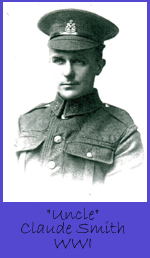
Meanwhile, Uncle was still overseas. He was injured at one point and was sent back to England. He never talked much about his Army days, but we do know that he was at both Vimy Ridge and Passchendaele, major battles in the First World War in which the Canadians distinguished themselves and in which there was much loss of life. Uncle was finally discharged in 1919 and sent home. He walked from Moose Jaw to the farm - about 70 miles. When Uncle returned from the war, Raymond felt he had to get a farm of his own for his family and his new wife. He took the only land close by that was available but it was not good land - it was very sandy and stony.

Stanley died of pneumonia or the flu on April 4, 1922, at less than 2 years of age. There may have been a flu epidemic in 1922, as we noticed several graves of young children in the Davyroyd churchyard, all dated around 1922. Mildred returned to England for a visit in early 1923, taking Joy, Sid, Oliver and Edith to help her look after them. Once Mildred got to England, she decided to stay, but Raymond wrote a beautiful letter encouraging her to return, which she did. Later that year, Edith, aged 18, married Percy Pearson so Mildred no longer had Edith's help with the children. Art was born to Raymond and Mildred a couple of years later.
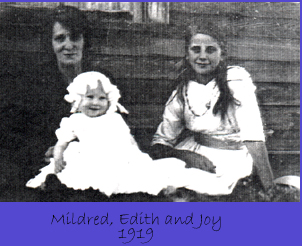
As the local midwife and public health nurse, Martha Pearson was often at the Hazle home. She was always very helpful and supportive of the family and the two families were close. Thus Edith and Percy, Martha's eldest son, got to know each other and they married in October of 1923. Edith moved to Percy's farm, and we think that Martha and Will, Percy's parents, also lived with them. Edith and Percy started their own family a year and a half later when Joan was born.
There were many very bad years in the 1920's and '30's - with often very little rain in the spring, high temperatures in the summer, and four to five feet of snow in the winter. The "Dirty '30's" were particularly hard - no rain and many dust storms blowing away the topsoil. Many people couldn't even afford to buy seed to replant so they just walked away from the land. That's what Edith and Percy did in 1927 - with many years of drought, dust storms, crop failures and grasshoppers behind them, the final payoff was a hailstorm that wiped out a reasonably good crop, so they decided to leave. They packed up what they could and with the two children, Joan and Hazel, and Percy's parents, Martha and Will, drove out to Victoria.
Sid does not have a lot of memories of his early years. He started school at Roselea School, but could only attend in spring and fall as they lived four miles away and had no means of transportation in -30 and -40 degree winter weather. He says his memories of the early years seem to be overshadowed by Raymond's leaving when Sid was about seven years old. Raymond suffered from severe depression and was placed in a home in Weyburn around 1930. Nowadays, he probably could have been helped but in those days nothing could be done, except to provide institutional care.
After Raymond was institutionalized Mildred stayed on the farm for a while. Ray says that Uncle kept them supplied with vegetables and potatoes as he always had good gardens, and that if it hadn't been for Uncle she and the children would have starved to death. But Mildred couldn't manage the farm alone and moved into Readlyn in 1931. Bill Wothe, a friend and neighbour, rented Raymond's farm and worked the land. Mildred and Sid were the school janitors for many years - looking after the school furnace. Ray remembers Mildred's hands always being black from handling the lignite coal. They made about $20 a month as janitors and she also received Welfare. She did everything she could to make a dollar to provide for her family. Sid remembers going at 7 a.m. in the winter when it was cold and still dark, carrying a lantern, to have the furnace going for the school to be warm by 9 a.m. He had to tend to the furnace all day then stay afterwards to sweep three classrooms while his buddies went out to play ball or to skate. Sid also got the job of meeting the train daily to pick up the mail, and deliver it to the Post Office. He had to be bonded and was pretty proud to have such a responsible job as a kid. He was always active in sports, playing on a baseball team every summer and a hockey team in the winter. In town he helped to run a billiard hall and he played a lot of billiards.
By the early '30s the older members of the family had scattered. Ray was living and working on Uncle's farm and Edie and Percy were raising their children in Victoria. In about 1931 Ron and Ernie went to Chicago with Bill Wothe, entering United States illegally. Ernie and Bill only stayed a short while, but Ernie was stopped trying to return to Canada at the border near Seattle and was tossed into jail. The authorities threatened to return him to England but Edith and Uncle managed to provide proper identification and he was released at the border. Joan remembers a knock on the door one day in about 1932 - and Edith threw her arms around a strange man standing there. He was ragged and thin, with holes in his shoes. It was Ernie after he had been released at the border. Ernie and Bill Wothe and their families remained great friends, living in Courtenay BC, until Ernie's death in 1993. Ron later returned to Canada and re-entered the United States legally, at Detroit. He lived in Chicago from then on, where he owned a pub.
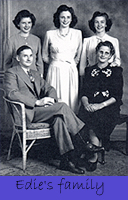
Art commented that nowadays we have five major things -- electricity, water, sewers, telephone, TV. In those days you were lucky to have a radio!! He remembers Mildred and Sid going over to Mr. Emery's house to listen to the radio broadcast of the Coronation in 1937, because they didn't have a radio of their own. It was quite an exciting thing and very important to Mildred who had quite a soft spot in her heart for England and royalty.
When Mildred's children were young they loved to go to Uncle's farm. There were two dugouts for swimming - and even diving boards. Uncle would come in with the horse and wagon - hauling grain - and he would take the kids back out to the farm with him. It would take hours to get there and back but it was the kind of thing Uncle loved to do for them. Every summer Oliver and Sid helped Uncle and Ray on the farm - they went as soon as school was out in June and stayed through harvest.
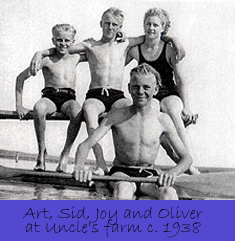
All six brothers were in the services during the Second World War. Ray was in the Army in Winnipeg, Ernie in the Army in England, Ron in the American Navy stationed in Hawaii, Art in the Army at Shilo, Manitoba and Sid and Oliver in the Canadian Navy.
|
|
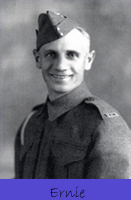 |
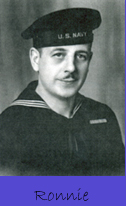 |
|
|
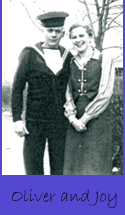 |
 |
In about 1940 or '41, Edith became concerned about Raymond being in the home in Weyburn so she went back to the Prairies and brought him to Victoria. He lived with her family for a while, even though there was little extra space for him - he slept in the living room. He is remembered as a somewhat confused old gentleman. He would play the piano for a short while and then would rub his hands and moan about how badly he played and how sorry he was that he had let all the kids down. Raymond had a great deal of musical talent and it is a shame that the opportunity to enjoy it was lost in his life on the Prairies. However, it is a talent and a love that has been passed down to many in his family. Edith eventually had to put him into a nursing home near Beacon Hill Park in Victoria. He died August 6, 1943 of bronchial pneumonia. Sid remembers getting a telegram on board ship telling him that his father had died. It had been mailed and he got it a week or so after his Dad's death.
Oliver had joined the Navy as a stoker because he loved playing around with mechanics but soon was in the commandos. Later, when Sid was in Hamilton taking a "navi" course and Ollie was in Toronto learning how to operate the diesel barges, Ollie came down to Hamilton one weekend. Sid remembers walking to the outskirts of Hamilton to say good-bye to him. As Ollie went across the bridge Sid watched from the other end and had the funny feeling then that he would never see Ollie again.
Sid spent two years on convoy duty in the North Atlantic on the destroyer HMCS Gatineau. It was on one of those trips across the Atlantic that Sid got the news of Ollie's death in Sicily in the Italian campaign of 1943. Bob Templeton was there and he helped Sid through a very dark day in his life. Ollie had only been in the Navy a year. For many years they did not know where Ollie was buried but a relative of Uncle's was visiting a cemetery while on vacation in Italy and found his grave in Salerno. After the war the Saskatchewan Government named formerly unnamed lakes in the northern part of the province in memory of "the boys who didn't come back." Hazle Lake is about 300km north of North Battleford.
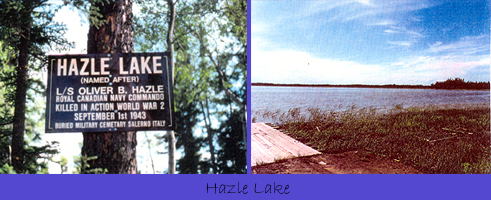
After Oliver's death, at Mildred and Joy's request, Sid asked for and received a compassionate discharge in April of 1945. While Sid was in the Navy, Mildred and Joy had moved from Readlyn to Assiniboia where Joy worked as a telephone operator for SaskTel. They had moved to Moose Jaw where they were living when Sid was discharged. He lived with them and took a course in radio mechanics paid for by his naval gratuities. During this time, Joy married but the marriage didn't work out. She contracted multiple sclerosis, was confined to a wheelchair and moved back home again living with Mildred until her death in 1957. She lived with MS for thirteen years.
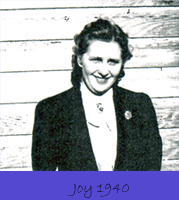
Ernie married Evelyn Kukowski in 1938 and their son, Claude, was born in 1939. They divorced after the war. Ernie then married Mary Conn and had three more children, Jim, Ron and Lynn. Ron died in 1983. Ernie ran various businesses after returning from the war - at different times he had a gas station and a drygoods store in Morse, Saskatchewan, and later a farm and a meat locker business in Courtenay, BC. Ernie died in 1993. Mary, Jim and Lynn and their families live in Courtenay and Claude lives in Vancouver.
Sid met Joyce Orr in 1945 - on their first date he asked her what her full name was. He was surprised to hear that it was Edith Joyce, since he had a sister Edith and a sister Joy! They were married in July of 1949, and have 2 daughters, Wendy and Leslie. They have lived in Moose Jaw and Courtenay but in 1960 they finally settled in Calgary, where they still live. Sid is now retired and they have celebrated their 50th Wedding Anniversary.
Art married Phyllis Morris in 1952 and they moved around a bit while he was in the oil business. In 1959 they moved from Regina to Calgary where they still live and where Art runs his own business. They had four children, Craig, Scott, Susan and Brenda. Scott died in 1990. Art continues to be very active and was instrumental in organizing the famous "Hazle Family Reunion" in Readlyn in 2000. Art and Phyl have also celebrated their 50th Wedding Anniversary.
After the war, Ray met Violet Crawford in Winnipeg. They married in 1947 and Violet, and her three children from a previous marriage, John, Clark and Gail settled into the farm home with Ray and Uncle! Uncle was very self-sufficient around the house and was an excellent cook, making buns and bread, and canning meat and vegetables. Nevertheless, he welcomed Vi and her three children into the home and, according to Ray, did everything he could to make her happy and comfortable. Ray says, "He even got the power in for her." Vi did have a couple of funny stories to tell about trying to cook for the two men though. When she and Ray were first married she made a fresh rhubarb pie. Uncle said, "Your pie is very nice, Violet, but couldn't you find anything else to put in it?" That's how Violet learned that he didn't like rhubarb! Another time, he stuck up for Violet when she made a lemon pie and got the top a little bit too brown. Ray teased her about it, but Uncle stood up for Vi. He said, "I like pies like this, there's nothing wrong with it!" Ray and Vi, too, celebrated their 50th wedding anniversary. Ray died August 5, 2000 - less than two weeks before the family reunion in Readlyn.
Edie spent the rest of her life in Victoria where she died in 1979. After Percy's death she married Tom Pratt. Her daughters still live in BC: Joan in Vernon, Hazel in Kamloops and Vera in West Vancouver.
Ron met and married Evelyn Anderson in Chicago prior to World War II. Their three daughters, Anita, Brenda and Rhonda have remained in the Chicago area and are raising their families there.
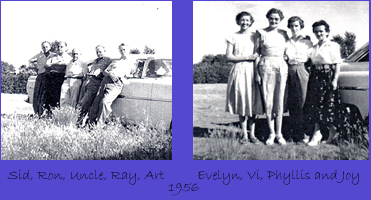
Mildred died in 1972. Ray thought a lot of Mildred and went back to the Prairies for the funeral although he was in British Columbia at the time of her death.
Uncle was a very special person for the children in both families. Sid says, "He was the most wonderful guy in the world." His steady presence was probably the saving grace for the first family in their adjustment to farm life, their mother's death and Raymond's remarriage to Mildred. Besides being a good worker on the farm, he was very good in the kitchen, and was probably the mainstay for the whole family. He never married, but the Hazle children became his family. He was known simply as "Uncle."
Sid remembers that he, Ollie and Art got very close to Uncle, who used to take them down to the Lake of the Rivers to teach them how to swim. Joy used to come out in the summer months when she could get off work. Uncle probably became the father that they lost when Raymond went into the home in Weyburn.
Uncle retired to Cobble Hill, British Columbia, and then to Victoria in 1973 where he lived with Edith for some years. He would go for a walk every morning to a nearby coffee shop where he would meet his buddies. He would get himself all dressed up, even to his overcoat and hat and would sit in the kitchen to wait until precisely 10 o'clock before he would leave. Edie was very fond of Uncle and enjoyed having him living with her. After her death in 1979 he lived for a few more years in her condominium, but eventually went into a Veterans' Home as he was no longer able to manage on his own. After Joan moved from Victoria to Vancouver, she sometimes went to see him. This involved a full day's trip by the time she got the ferry and into Victoria, arriving about 2 o'clock one afternoon. He pulled himself together when she arrived and visited with her for about half an hour and then he said, "You know, I like you to come but I don't like you to stay too long." So Joan chatted for a few more minutes, and then Uncle said, "You know, I like you to come etc. etc. etc." She got the message. She figured she'd been there about 35 minutes all told.
On July 25, 1984, Uncle celebrated his 100th birthday. The Veteran's Home arranged a wonderful birthday party for him and many members of the family attended. Ray and Vi arrived from Winnipeg; Ernie and Mary from Courtenay with Jim and Lynn and her daughters, Phyllis, Sid and Joyce from Calgary, and Claude and Penny from Vancouver with their children. Uncle was thrilled with his cake and kept testing the icing when no one was looking!
|
|
|
Uncle died in Victoria on September 2, 1987 at the age of 103. Art organized a memorial service in Davyroyd Church near Readlyn. More than 125 people came to the service - a real tribute to a gentle caring man - a man with no children of his own, who left a wonderful legacy for the eight Hazle children and their descendants.
The weekend of August 18 - 20, 2000 was a very special one for the Hazle family. Art, with the help of his children, organized and put on a wonderful reunion in Readlyn Saskatchewan.
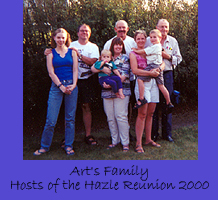
As many members of the family as could possibly make it were there. Unfortunately, Ray had died just two weeks before the event and Vi was not able to attend. Joan, Hazel and Vera and their families represented Edie. Claude was there for Ernie. Rhonda and Brenda came all the way from Chicago for Ronnie. Sid and Joyce and Wendy and Leslie were there as were Art, Craig and his family, Susan and her family and Brenda. Claude was delighted to be reunited with two of his Chicago cousins whom he had met in 1957 and had not seen since.
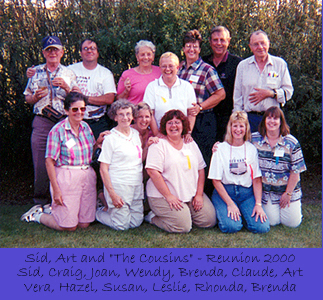
Art showed everybody around the area and pointed out many of the places told of in family stories. Uncle's house, the Readlyn Church and cemetery and the Pearson home site were only a few of the places everyone visited. All agreed that Art and his family had done a "bang up job" and deserved a huge vote of thanks for reminding us of our history and bringing Raymond, Ada and Mildred to life for so many of us.
|
|
|
|
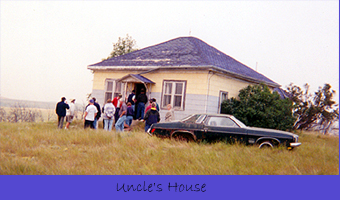 |
 |
|
In 2003, the Hazle family is thriving. Raymond, Ada and Mildred had nine children (eight lived to adulthood). Those eight had nineteen grandchildren who had forty-five great-grandchildren. Those forty-five to date have had thirty-nine great-great-grandchildren and at least four great-great-great grandchildren. Raymond, Ada and Mildred have at least one hundred and eighteen descendants!
